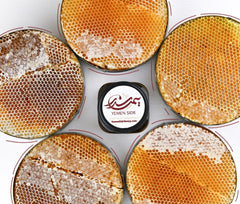Long before honey was just a drizzle away from our morning oatmeal or pancakes, it was revered in numerous ancient cultures. The story goes back to 5500 BC in Ancient Egypt, the origin of the oldest written record about the use of honey. The Egyptians observed the honey as ambrosial dew that derived from the absolute divinity, and was so powerful as a substance that it could invigorate the health of anyone, even the gods. Therefore. the liquid bee-gold was believed to be the most efficient therapeutic and, thus, was found in about 1000 ancient remedies. Ancient Mesopotamians as well as our Medieval predecessors prescribed honey as a medicament and believed that it was no less than an elixir. Due to its extraordinary antibacterial properties, honey was often used as an antiseptic cover that protected wounded areas and, moreover, as a medicine that casted away nausea.The potent healing properties of honey were also recognized in the Bible, and espoused during the time of Buddha and by the prophet Muhammad. The Quran, in fact, allude to honey as a healer for all mankind.
Today, the unique benefits of honey are often practiced by many, using it as a natural treatment for digestive and respiratory problems. In addition, honey is one of the greatest allies in almost any beauty ritual regarding skin or hair. Recently, researches in the realm of modern science have proven and explained the long recognized value of the honey. A new study by researchers from the University of Ottawa has shown that the antibacterial properties of honey are potent enough to destroy the bacteria which cause chronic sinusitis.
SIDR HONEY KILLS BACTERIA:
Each year, millions of people are affected by chronic sinusitis.
Chronic sinusitis is a common health problem in which the mucous membranes in the cavities around the sinuses become inflamed and swollen. These obstructions of the nasal passages cause headaches, mucus buildup, clogged nose, facial pain and difficulties in breathing. Most frequently, chronic sinusitis is caused by allergies but, also, by bacteria that colonize in the nasal passages and attack the sinuses.
Although is not a regularly prescribed medicine, honey can help overcoming the difficulties that patients with chronic sinusitis face.
The researchers from the University of Ottawa, who worked on the study, conducted by Tala Alandejani, MD, tested two types of honey: Manuka and Sidr. The Manuka honey comes from the Manuka bush, also known as Tea tree, native to New Zealand.The Sidr honey, on the other hand, originates from the Sidr tree native to Yemen. It is an ancient tree which is considered sacred as it’s been mentioned in spiritual texts. The Sidr honey is one of the most expensive honeys in the world.
The researchers singled out three particularly harmful bacteria that colonize during chronic sinusitis: two strains of staph bacteria, MSSA (methicillin-susceptible Staphylococcus aureus) and MRSA(methicillin-resistant Staphylococcus aureus), and a third one called Pseudomonas aeruginosa (PA). After a thorough research and testing, the researchers concluded that the two types of honey were effective in destroying the bacteria. Even bacteria which were growing in a biofilm, i.e. a thin, slimy layer formed by bacteria that are resistant to antibiotics, were susceptible to the antibacterial potential of the honey.
The researchers also found that the two types of honey worked significantly better than an antibiotic against MSSA and MRSA, comparing to a past research.
Research results:
Sidr honey was 63% effective in killing MSSA.
Sidr honey was 73% effective in killing MRSA.
Sidr honey was 91% effective in killing PA.
Manuka honey was 82% effective in killing MSSA.
Manuka honey was 63% effective in killing MRSA.
Manuka honey was 91% effective in killing PA.
The scientists who participated in this research sincerely hope that the results will contribute to a new treatment for patients with chronic sinusitis. The study was presented at the 2008 American Academy of Otolaryngology — Head and Neck Surgery Annual Meeting in Chicago.
Sources:
http://www.webmd.com/news/20080922/humble-honey-kills-bacteria
Alandejani, T. Otolaryngology — Head and Neck Surgery, August 2008, vol 139, issue 2, supp 1: p 107.
Warning:
Honey can contain the bacteria that causes infant botulism, so do not feed honey to children younger than 12 months.



